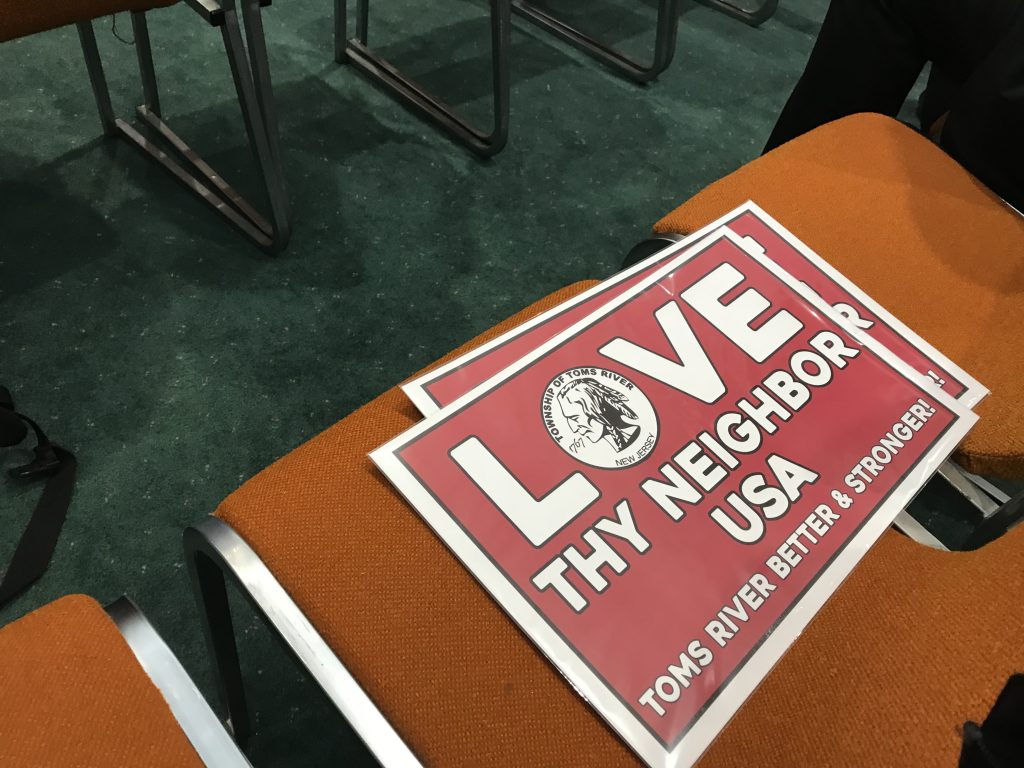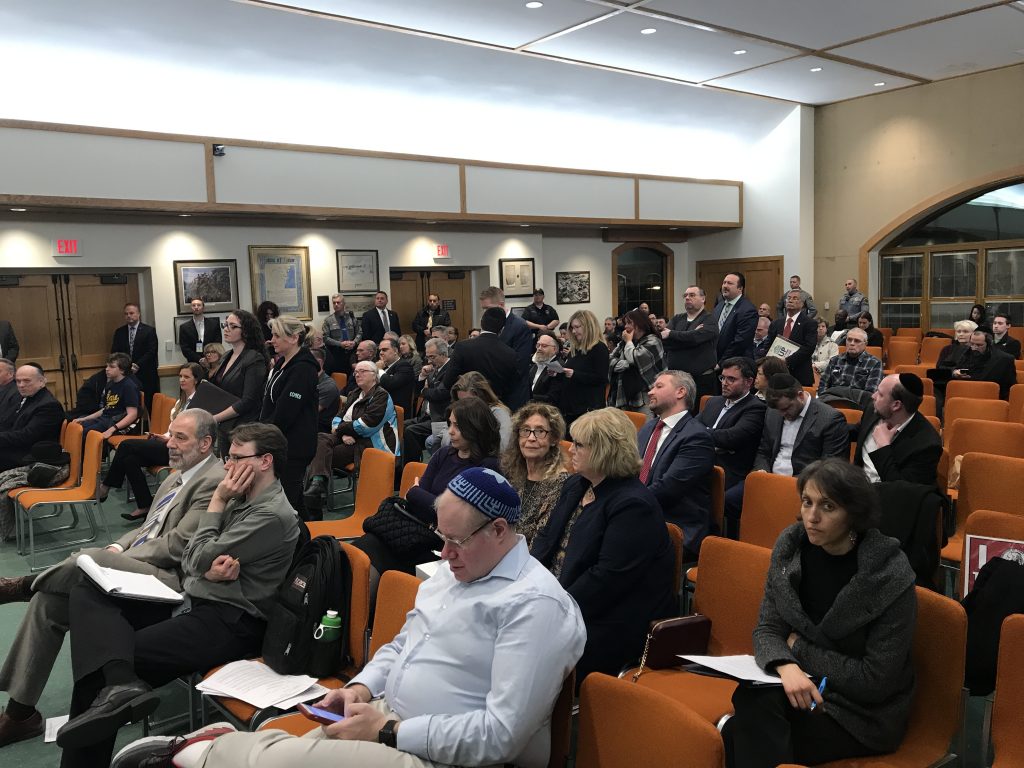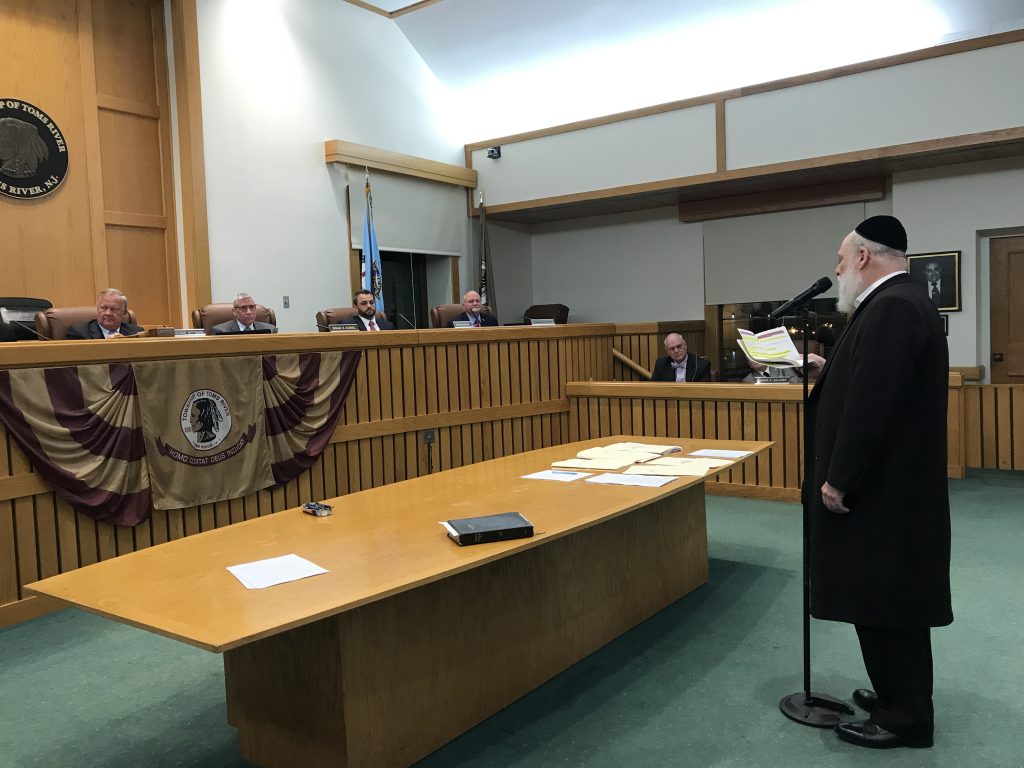
The Toms River township council discusses a hate speech resolution, Feb. 26, 2019. (Photo: Daniel Nee)
The Toms River township council on Tuesday night unanimously passed a resolution opposing hate speech and publications that promote it, but stopped short of expressly condemning a Facebook page which has drawn the ire of some in the Jewish community – especially Lakewood’s Orthodox community.
Before Tuesday night’s council meeting, a group of multi-faith leaders, including Christian, Jewish and Muslim clerics, held a press conference and specifically asked that the council condemn the Facebook page Rise Up Ocean County, which often publishes articles and videos to raise awareness on issues of overdevelopment and what is viewed as political corruption in the Orthodox community in Lakewood and Jackson. Many in those communities, however, have accused the page of promoting anti-Semitism and have pointed to comments made by followers and a modified version of a famous poem written about the Holocause that appeared on the site. (The site’s administrators, who have remained anonymous, later apologized for the poem incident.)
“While we realize that some hate speech is protected under the first amendment, it is still hate speech,” said Samantha Gertner of Ocean County RAFT, an acronym for “Reaching Across Faith Traditions. “Rise Up Ocean County is cultivating an environment … that may lead to violence and hateful activity.”
The pre-meeting press conference was organized by Michael Cohen of the Simon Wiesenthal Center, a Jewish advocacy group that “confronts anti-Semitism, hate and terrorism, promotes human rights and dignity, stands with Israel, defends the safety of Jews worldwide, and teaches the lessons of the Holocaust for future generations.”
Cohen strongly urged the council to include the name of the Rise Up Ocean County page in its resolution.
“It is important that it is specifically mentioned and specifically condemned in this fashion,” Cohen said.
The council, however, passed a more broad condemnation of hate speech and publications that promote it, said Anthony Merlino, assistant township attorney.
The resolution states that the township: “Opposes and condemns – as an abuse of constitutional free speech guarantees – all communications, publications and other forms of expressing that promote, purvey or perpetuate hatred, bigotry or prejudice against certain individuals.”
The resolution further acknowledged that freedom of speech also comes with responsibility for one’s words.
“That responsibility is often ignored, and the right to freedom of speech abused by the publications that appeal to, promote or incite bias, bigotry and prejudice against certain individuals,” the resolution stated. “Those publications, in whatever form, hinder a constructive dialogue … and have no place in the civic discourse contemplated by the civic guarantees in the federal and state constitutions.”

The Toms River township council discusses a hate speech resolution, Feb. 26, 2019. (Photo: Daniel Nee)
Rise Up Ocean County, for its part, has likewise highlighted some instances in which members of the Orthodox community referred to non-adherents in a negative fashion, including a comment in a video posted by the page last week in which an Orthodox leader said some in the community would find local neighborhoods too “goyish,” a phrase used to describe non-Jews that is often considered derogatory.
The page was silent on Tuesday about the Toms River vote.
Rise Up Ocean County is seen by some as a hate group and others as an investigative outlet that largely focuses on land use issues, politics and population growth. The group first sparked controversy when it published a modified version of the famed “First they came for…” poem by Martin Niemöller, which tells the story of the Nazi party’s terror campaign against numerous groups prior to the Holocaust and warns readers to speak up when they see injustice. The page’s version substituted groups such as “trade unionists” with “my Board of Education,” and “my house,” referring to controversies over school funding in Lakewood and aggressive real estate buyers in Toms River.
Last week, the Ocean County freeholder board adopted a resolution that specifically condemned the page by name.

Scott Gartner addresses the Toms River township council, Feb. 26, 2019. (Photo: Daniel Nee)
The discussion at the council meeting Tuesday remained civil, and even had a few lighthearted moments. But one resident’s sad story led to tears flowing across the room. Scott Gartner, a Silverton resident who is Jewish Orthodox, said his wife – “that beautiful lady sitting right there who I’ve been married to for 35 years” – had a cup of iced coffee thrown at her while the couple were walking near their home.
“The young man admitted that he solely threw it based on my visual appearance as an Orthodox Jew,” said Gartner, who said despite the bias act, he does not want to person’s life to be ruined and prays he’ll learn from the experience.
“Hate does not have a place in my heart,” Gartner said.
Cohen said he was disappointed that the council’s resolution did not specifically name Rise Up Ocean County.
“What they’re doing is wrong,” said Cohen. “Anything less than calling them out specifically in that regard is disappointing. We have a hateful entity in our midst.”
Phil Brilliant, president of Congregation B’nai Israel, a non-Orthdox synagogue that practices Conservative Judaism, praised the resolution and called for unity. The congregation is celebrating its 70th anniversary next year, but its roots go back 200 years, he said.
“Whether in the 1800s or today, people came to Toms River looking for a better place to live and raise a family,” Brilliant said. “Why would we teach our children, and our children’s children, anything but ‘love thy neighbor.’”


Police, Fire & Courts
Thief Robs Toms River Restaurant, Pictured Walking Down Street Carrying Safe

Police, Fire & Courts
Intricate Nature of Toms River Jewelry Heist Revealed; TRPD Has Leads

Police, Fire & Courts
Thief Robs Toms River Restaurant, Pictured Walking Down Street Carrying Safe







